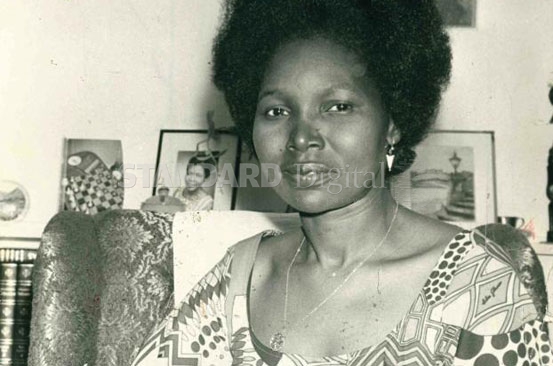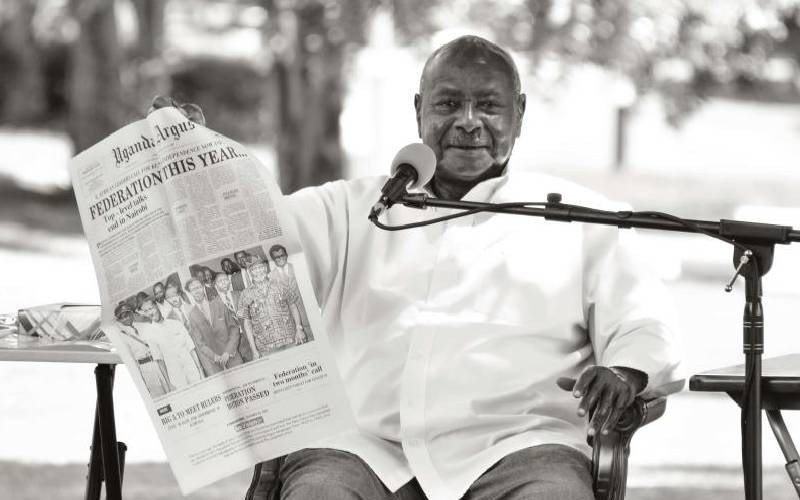
Grace Akinyi Ogot, the former Gem MP who died on Wednesday, skillfully combined politics with a serious literary life that saw her publish several highly acclaimed books.
Through her writing, Mrs Ogot powerfully influenced East Africa's literary narrative. She helped found the Writers Association of Kenya in 1976 and had a stint as its chair.
At a time when few female names featured in Kenya's political landscape, Ogot in her industrious nature was spotted by former President Moi's Nyayo government and was nominated as an MP. When the murder of Gem MP Horace Ongili Owiti occasioned a by-election in 1985, Ogot threw herself into the ring and was elected the first and only woman MP for Gem.
That and her elevation to assistant minister put her in the league of Julia Ojiambo, who was Kenya's first woman assistant minister, Grace Onyango, Kenya's first woman MP and Winfred Nyiva Mwendwa, first woman Cabinet minister. She lost her seat to Oki Ooko Ombaka in the 1992 General Election.
The third-born of seven children to Joseph Nyanduga, an early missionary in Nyanza and Mama Rahel Gori, Ogot's literary mind was whetted by the traditional folk tales she heard from her paternal grandmother.
Even as a little girl growing up in pre-independence Kenya, Grace had a natural knack for telling great stories and so it was no surprise when years later, she held an entire conference on African literature enthralled when she read her story, 'The Year of Sacrifice' at Makerere University, Uganda in 1962. It was later titled 'The Rain Came' and published in 1963, and was followed in 1964 by 'Ward Nine'.
Grace was a pioneer who broke barriers for women at a time when social attitudes saw little value in educating girls, thanks to her father. She attended the famous Ng'iya Girls School and Butere High School before training as a nurse in Uganda.
She later worked at England's St.Thomas Hospital for Mothers and Babies and at Maseno Hospital in Kenya. She married Prof Bethuel Allan Ogot in 1959 and they had four children.
Her marriage
Her first book; 'The Promised Land' was published in 1966. It was an epic 1930s saga tracing the migration of a Luo family from their ancestral home in Nyanza to Northern Tanzania and reflected a strong Christian upbringing that had immersed her in stories of the Old Testament.
Her stories were filled with an overwhelming sense of retribution, with heroes and heroines of strong character reaping what they sowed. But they were also easy for readers to identify with because of their many flaws.
They populated her other writings including 'The Strange Bride', 'The Graduate', 'The Other Woman' and 'The Island of Tears'.
Like Nigeria's Chinua Achebe, some of her early books captured the struggle between the demands of emerging Christianity and western culture in Kenya and the equally powerful traditions in the Luo culture.
Her marriage to Prof Ogot was a fortunate conspiracy of destiny that fused her proclivity for story telling with her husband's interest in oral tradition. Ogot was at the time researching the history of the southern Luo, drawing heavily from oral tradition. He readily appreciated her as a writer and pointed out the poetry in her courtship letters to him.
Stay informed. Subscribe to our newsletter
Among her works is 'Days of My Life', an autobiographical tale that portrays an African woman going against all the odds of racial prejudice and a colonial minority that did not expect Africans to excel in medicine.
The book published in 2012, goes into the author's education in colonial Kenya, revealing her leadership qualities, high moral values and her ability to learn local languages. But perhaps the most instructive thing about the book is the strength of the love between her and the man she married.
Among her first short stories published in the East African journal was 'Island of Tears' that followed the daylight assassination of Tom Mboya in 1969. Her other works include 'The Strange Bride' in 1989, 'The Graduate' (1980) and 'The Other Woman' (1976).
Ogot's political life went into low gear after 1992, but she remained active in matters development and women's welfare in particular. Her nephew Joseph Jamwaka says his aunt started having problems with her memory in 2006 with lapses that subsequently interfered with her public life.
"She fell in the bathroom and after several visits to hospital, a brain scan at Kisumu's Aga Khan Hospital revealed some bleeding in the brain, prompting transfer to the Nairobi Hospital where she underwent brain surgery and was later discharged. Aunty was undergoing care at home when her conditioned worsened on Wednesday and she had to be rushed to the Nairobi Hospital where she was pronounced dead on arrival," recounts Mr Jamwaka.
 The Standard Group Plc is a
multi-media organization with investments in media platforms spanning newspaper
print operations, television, radio broadcasting, digital and online services. The
Standard Group is recognized as a leading multi-media house in Kenya with a key
influence in matters of national and international interest.
The Standard Group Plc is a
multi-media organization with investments in media platforms spanning newspaper
print operations, television, radio broadcasting, digital and online services. The
Standard Group is recognized as a leading multi-media house in Kenya with a key
influence in matters of national and international interest.
 The Standard Group Plc is a
multi-media organization with investments in media platforms spanning newspaper
print operations, television, radio broadcasting, digital and online services. The
Standard Group is recognized as a leading multi-media house in Kenya with a key
influence in matters of national and international interest.
The Standard Group Plc is a
multi-media organization with investments in media platforms spanning newspaper
print operations, television, radio broadcasting, digital and online services. The
Standard Group is recognized as a leading multi-media house in Kenya with a key
influence in matters of national and international interest.







